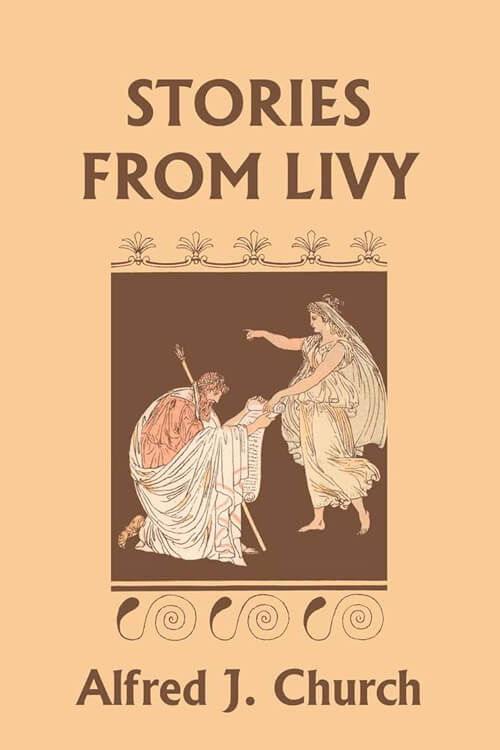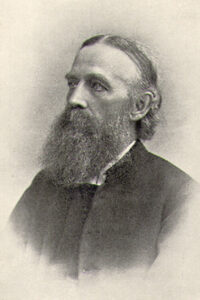
Stories From Livy
But it came to pass that Rhea bore twin sons, whose father, it was said, was the god Mars. Very wroth was Amulius when he heard this thing; Rhea he made fast in prison, and the children he gave to certain of his servants that they should cast them into the river. Now it chanced that at this season Tiber had overflowed his banks, neither could the servants come near to the stream of the river; nevertheless, they did not doubt that the children would perish, for all that the overflowing of the water was neither deep nor of a swift current Thinking then that they had duly performed the commandment of the King, they set down the babes in the flood and departed. But after a while, the flood abated and left the basket wherein the children had been laid on dry ground. And a she-wolf, coming down from the hill to drink at the river (for the country in those days was desert and abounding in wild beasts), heard the crying of the children and ran to them. Nor did she devour them, but gave them suck; nay, so gentle was she that Faustulus, the King’s shepherd, chancing to go by, saw that she licked them with her tongue.
This Faustulus took the children and gave them to his wife to rear; and these, when they were of age to go by themselves, were not willing to abide with the flocks and herds, but were hunters, wandering through the forests that were in those parts. And afterward, being now come to full strength, they were not content to slay wild beasts only, but would assail troops of robbers, as these were returning laden with their booty, and would divide the spoils among the shepherds. Now there was held in those days, on the hill that is now called the Palatine, a yearly festival to the god Pan. This festival King Evander first ordained, having come from Arcadia, in which land, being a land of shepherds, Pan that is the god of shepherds is greatly honored. And when the young men and their company (for they had gathered a great company of shepherds about them, and led them in all matters both of business and sport) were busy with the festival, there came upon them certain robbers that had made an ambush in the place, being very wroth because of the booty which they had lost. These laid hands on Remus, but Romulus they could not take, so fiercely did he fight against them. Remus, therefore, they delivered up to King Amulius, accusing him of many things, and chiefly of this, that he and his companions had invaded the land of Numitor, dealing with them in the fashion of an enemy and carrying off much spoil. To Numitor, therefore, did the King deliver Remus, that he might put him to death. Now Faustulus had believed from the beginning that the children were of the royal house, for he knew that the babes had been cast into the river by the King’s command, and the time also of his finding them agreed thereto. Nevertheless, he had not judged it expedient to open the matter before due time but waited till occasion or necessity should arise. But now, there being such necessity, he opened the matter to Romulus. Numitor also, when he had the young man Remus in his custody, knowing that he and his brother were twins and that the time agreed, and seeing that they were of a high spirit, bethought him of his grandsons; and, indeed, having asked many questions of Remus, was come nigh to knowing of what race he was. And now also Romulus was ready to help his brother. To come openly with his whole company he dared not, for he was not a match for the power of King Amulius; but he bade sundry shepherds make their way to the palace, each as best he could, appointing to them a time at which they should meet. And now came Remus also, with a troop of youths gathered together from the household of Numitor. Then Romulus and Remus slay King Amulius. In the meanwhile Numitor gathered the youth of Alba to the citadel, crying out that they must make the place safe, for the enemy was upon them; but when he perceived that the young men had done the deed, forthwith he called an assembly of the citizens, and set forth to them the wickedness which his brother had wrought against him, and how his grandsons had been born and bred and made known to him, and then, in order, how the tyrant had been slain, himself having counseled the deed. When he had so spoken the young men came with their company into the midst of the assembly, and saluted him as King; to which then the whole multitude agreeing with one consent, Numitor was established upon the throne.
Read or download Book
Rev. Alfred J. Church
Alfred John Church (29 January 1829 – 27 April 1912) was an English classical scholar.
Church was born in London and was educated at King’s College, London, and Lincoln College, Oxford. He took holy orders and was an assistant master at Merchant Taylors’ School from 1857 to 1870. He subsequently served as headmaster of Henley-on-Thames Royal Grammar School from 1870 to 1873, and then of King Edward VI School, Retford, from 1873 to 1880. From 1880 until 1888 he was a professor of Latin at University College, London.
While at University College in partnership with William Jackson Brodribb,[2] he translated Tacitus and edited Pliny’s Letters (Epistulae). Church also wrote several stories in English re-telling of classical tales and legends for young people (Stories from Virgil, Stories from Homer, etc.). He also wrote much Latin and English verse, and in 1908 published his Memories of Men and Books. Church died in Richmond, Surrey.
Publications
The Bible Examiner: Containing Various Prophetic Expositions
The Life of Cnaeus Julius Agricola by Tacitus, Translated by Alfred John Church and William Jackson Brodribb
Select Letters of Pliny the Younger. (1871); translated and edited by A. J. Church and W. J. Brodribb
Stories from Virgil. (1879)
Stories from the Greek Tragedians. (1880)
The Story of the Persian War. (1881)
Stories of the East from Herodotus. (1881)
Roman life in the days of Cicero. (1883)
Stories from Livy. (1883)
The Count of the Saxon Shore. (1887) historical novel – with the collaboration of Ruth Putnam.
The Hammer. (1890)
Stories from the Bible (1890)
The Laureate’s Country (1891) – with illustrations from drawings by Edward Hull.
Callias. (1891)
The burning of Rome: or, a story of the days of Nero. (1891)
The Story of the Odyssey. (1892)
The Story of the Iliad. (1895)
Lords of the World. (1897)
Stories from Ancient History (1907) – with illustrations by H. R. Millar.
The Faery Queen and Her Knights (1909)






